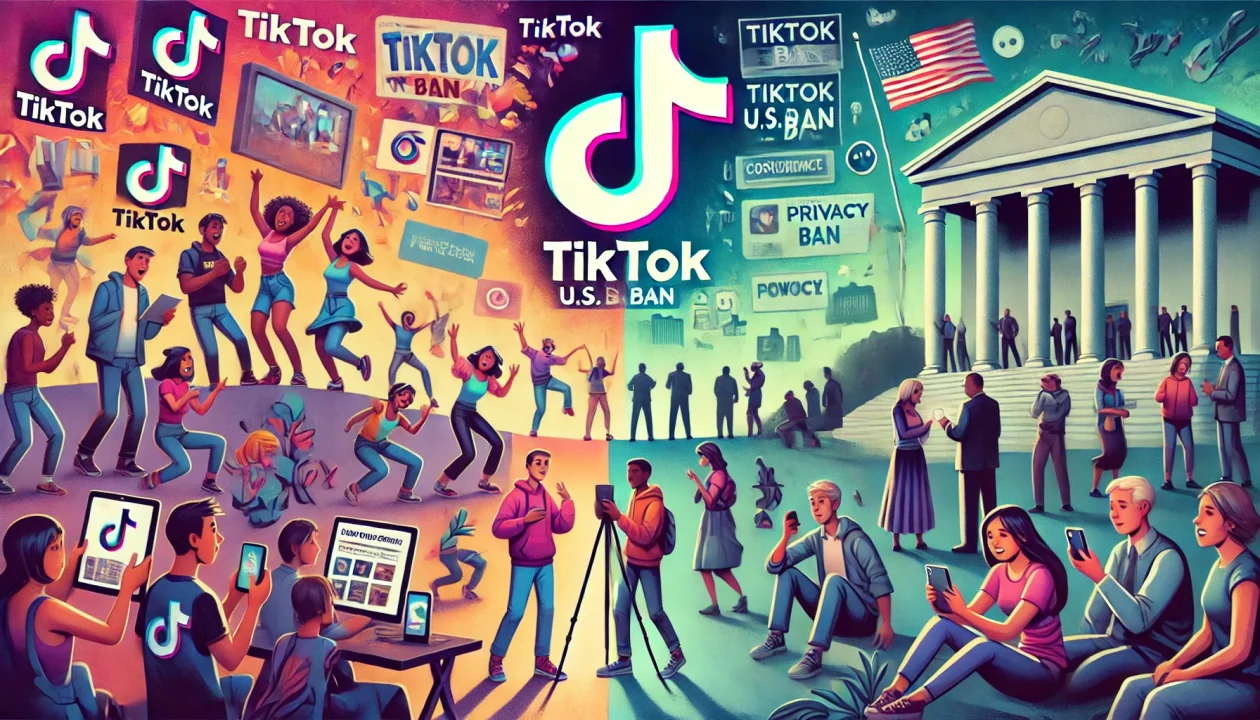
No platform has transformed culture and commerce quite like TikTok, but its future in the U.S. hangs in the balance. In the U.S. ban debate, questions of privacy and security threaten to redefine its role in American life—or remove it entirely.
Launched in 2016, TikTok is a social media platform that allows users to create, share, and discover short-form videos. TikTok has become a cultural phenomenon, captivating a global audience with its viral trends, creative challenges, and unparalleled ability to turn ordinary users into internet sensations. Its user-friendly design and advanced algorithm make content creation accessible to anyone, with every user having the potential to ‘go viral.’ TikTok’s algorithm uses machine learning (ML) and natural language generation (NLG) to recommend personalized content on users’ “For You” Pages (FYP).
As of 2023, TikTok boasts 1.04 billion monthly active users worldwide, with 170 million in the U.S. alone. American adults, on average, spend 58.4 minutes daily on the app, surpassing the time spent on YouTube and Netflix. This surge in usage has also led to significant economic contributions, particularly for small businesses.
This widespread appeal hasn’t just captivated users; it has also made TikTok a powerful driver of economic growth, especially for small businesses. In 2023, TikTok drove $15 billion in revenue for U.S. small businesses and contributed $24.2 billion to the U.S. GDP. Small businesses reported increased sales, with 88% experiencing higher revenue after promoting their products or services on the app. In Maryland, TikTok-supported SMBs contributed $390 million to our state’s GDP and supported 3,700 jobs.
TikTok’s meteoric rise has not come without scrutiny. At the center of the debate is its Chinese ownership under ByteDance, which has raised concerns about data privacy and potential governmental influence. Critics argue that the platform’s vast troves of user data could be accessed by the Chinese government, fueling fears of surveillance or propaganda. These concerns have sparked legislative efforts to restrict TikTok’s operations in the U.S.
Chinese ownership under ByteDance, which has raised concerns about data privacy and potential governmental influence. Critics argue that the platform’s vast troves of user data could be accessed by the Chinese government, fueling fears of surveillance or propaganda. These concerns have sparked legislative efforts to restrict TikTok’s operations in the U.S.
In May 2023, Montana proposed a state ban on TikTok, citing its failure to remove dangerous content such as viral challenges encouraging risky behavior like cooking chicken in NyQuil or inducing unconsciousness through oxygen deprivation. The state also argued that TikTok’s operations posed a risk of espionage, potentially allowing the Chinese government to track public officials and journalists. However, a federal judge blocked the ban before it took effect, citing state overreach, First Amendment violations, and a lack of evidence to support claims of espionage or propaganda
Earlier, in February 2023, the Biden administration banned TikTok on government devices. This was followed by an April 2024 bipartisan law requiring ByteDance to sell TikTok’s U.S. operations or face a nationwide ban by January 19, 2025.
ByteDance and TikTok have challenged the law, citing First Amendment violations. The Supreme Court heard arguments on January 10, 2025, with a decision expected soon as the ban is set to take effect on Sunday, January 19, 2025.
The outcome could result in either a forced sale of TikTok’s U.S. operations or a complete ban, potentially extended if a sale is underway. Additional legislative efforts, like the Extend TikTok Deadline Act introduced by Senator Ed Markey and supported by Congressman Ro Khanna, sought to extend the TikTok deadline by 270 days. Although the bill did not pass, President Biden may be able to grant a one-time 90-day extension.
The threat of a ban has already driven users to explore alternatives like RedNote, known in China as Xiaohongshu. In English, its name translates to ‘Little Red Book.’ The app recently hit No. 1 on Apple’s U.S. App Store, with masses of TikTok users creating accounts on and including hashtags such as #tiktokrefugee.
A ban on TikTok would undoubtedly disrupt small businesses that rely on the platform for marketing and alter the social media landscape where cultural trends thrive. However, the debate underscores a difficult balancing act between fostering economic and social benefits and addressing legitimate concerns about data privacy and national security. As the U.S. government deliberates, it faces the challenge of weighing these competing priorities to set a precedent for navigating innovation in a globalized world.
